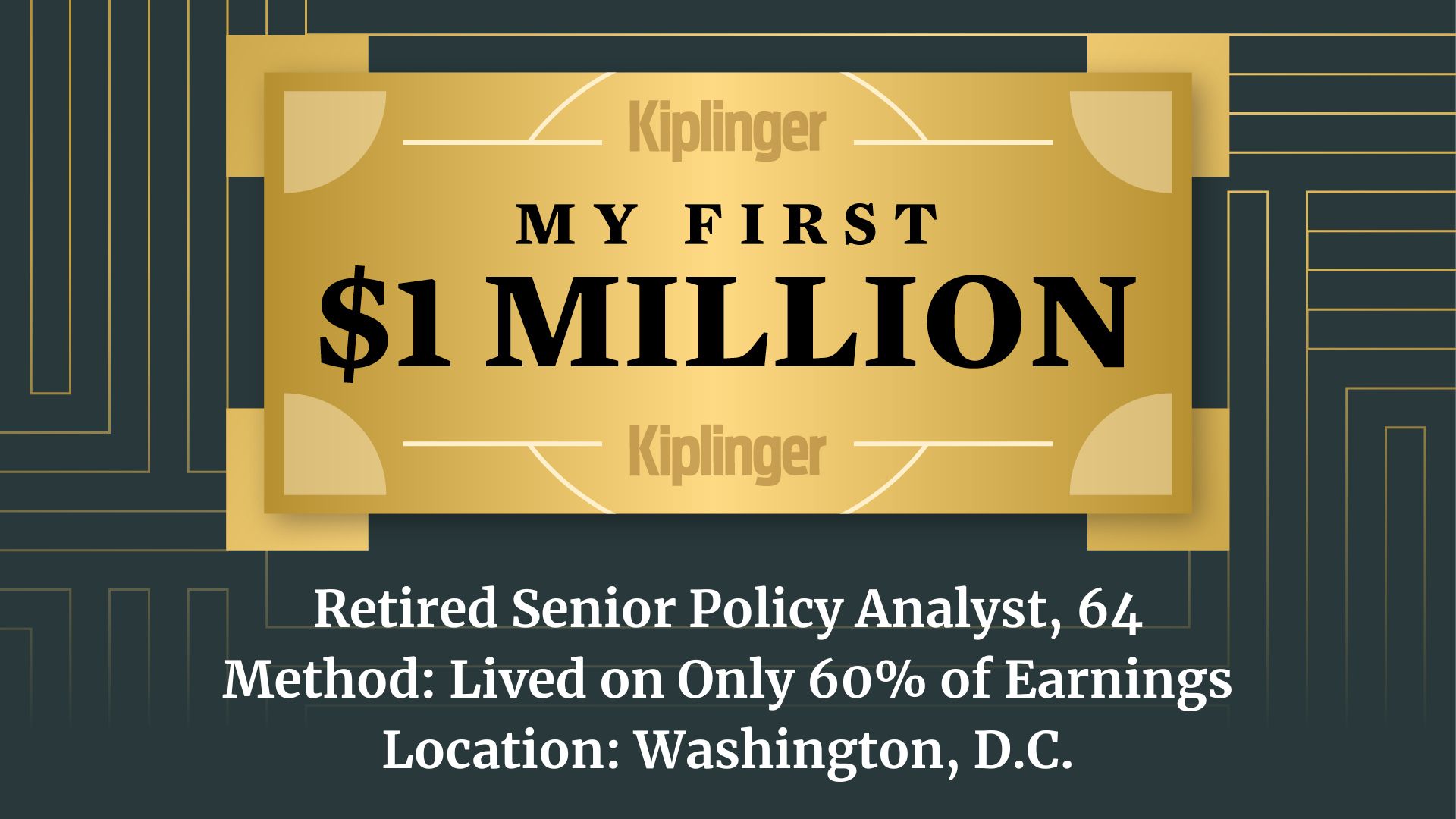Credit Card Closed? Here's Why and What to Do Next
If your credit card closed, here's why that might have happened and what to do next.

Ellen B. Kennedy

Profit and prosper with the best of Kiplinger's advice on investing, taxes, retirement, personal finance and much more. Delivered daily. Enter your email in the box and click Sign Me Up.
You are now subscribed
Your newsletter sign-up was successful
Want to add more newsletters?

Delivered daily
Kiplinger Today
Profit and prosper with the best of Kiplinger's advice on investing, taxes, retirement, personal finance and much more delivered daily. Smart money moves start here.

Sent five days a week
Kiplinger A Step Ahead
Get practical help to make better financial decisions in your everyday life, from spending to savings on top deals.

Delivered daily
Kiplinger Closing Bell
Get today's biggest financial and investing headlines delivered to your inbox every day the U.S. stock market is open.

Sent twice a week
Kiplinger Adviser Intel
Financial pros across the country share best practices and fresh tactics to preserve and grow your wealth.

Delivered weekly
Kiplinger Tax Tips
Trim your federal and state tax bills with practical tax-planning and tax-cutting strategies.

Sent twice a week
Kiplinger Retirement Tips
Your twice-a-week guide to planning and enjoying a financially secure and richly rewarding retirement

Sent bimonthly.
Kiplinger Adviser Angle
Insights for advisers, wealth managers and other financial professionals.

Sent twice a week
Kiplinger Investing Weekly
Your twice-a-week roundup of promising stocks, funds, companies and industries you should consider, ones you should avoid, and why.

Sent weekly for six weeks
Kiplinger Invest for Retirement
Your step-by-step six-part series on how to invest for retirement, from devising a successful strategy to exactly which investments to choose.
Has your credit card account been closed? Even those with good-to-great credit face hurdles at times, particularly if you forget about a card collecting proverbial dust in your wallet.
Credit card issuers can close your account due to what's known as "inactivity," meaning you haven’t used the card in a certain amount of time — let's say a year or more — and the issuer now assumes you have no use for that account.
A canceled credit card might lower a good credit score for several reasons. Here's what you need to know about closed accounts.
From just $107.88 $24.99 for Kiplinger Personal Finance
Become a smarter, better informed investor. Subscribe from just $107.88 $24.99, plus get up to 4 Special Issues

Sign up for Kiplinger’s Free Newsletters
Profit and prosper with the best of expert advice on investing, taxes, retirement, personal finance and more - straight to your e-mail.
Profit and prosper with the best of expert advice - straight to your e-mail.
Why your credit card closed
There are several reasons why your account might have been closed.
Your card is inactive.
If you haven't used your card for several months, your credit card issuer might close your account for inactivity.
Policies vary by issuer. Some banks might close a card after just six months of no activity, while others might wait 12 to 24 months. Card issuers are not required to give you advance notice, though you might occasionally see a warning in a statement or email.
If you aren't using the card, the issuer isn't making money from "swipe fees," the fees it charges merchants when you make a purchase with your card. Try to make at least one purchase a month on each card to avoid this type of credit card closure.
If you're not sure how to use credit cards to your own advantage, read up on how credit cards work.
You haven't paid your bill.
Your credit card company expects you to pay at least the minimum payment due each month (though paying in full is always the best practice for protecting your credit and avoiding fees).
If you fail to make any payments for 180 days, your card will be considered in default and will likely be closed. You should avoid this at all costs because it will decimate your credit score. Your credit card company will probably sell your debt to a collections agency.
You make charges over your credit limit.
If you habitually exceed your credit limit, the issuer might conclude that you're a poor credit risk and close your account. This scenario is most likely with charge cards, which require you to pay your bill in full each month.
Other reasons your credit card account might be closed.
If your credit score drops precipitously or the issuer discontinues the card, your account might also be closed.
It's important to note, if your account has unredeemed rewards when it’s closed, you’ll likely lose them. If you still carry a balance, the account typically converts to repayment-only — you’ll need to pay it off in full, but you won’t be able to make new purchases.
The right credit card can put money back in your pocket with every purchase. See Kiplinger’s top picks for the best cashback cards, powered by Bankrate. Advertising disclosure.
How a closed credit card affects you
Your credit utilization ratio may increase.
Closed credit card accounts can negatively impact your credit score for several reasons.
When an account is canceled, it decreases the amount of available credit and raises your credit-utilization ratio — the amount you owe as a percentage of your total available credit. Having a high credit utilization ratio can decrease your overall credit score.
Additionally, a closed credit card can sometimes impact the length of your credit history, as well as affect your mix of credit.
Your credit report has a long memory.
Closed credit accounts stay on your credit report for up to 10 years. If you had missed payments on the account before it was closed, those missteps remain on the account for seven years.
Next steps.
Even if an account is closed, all is not lost. You might be able to remedy the situation.
Card issuers don’t generally want to close an account because it’s hard to find and keep a good customer, says credit expert John Ulzheimer, author of The Smart Consumer’s Guide to Good Credit.
That's why it's a good idea to use cards you want to keep just often enough to keep them active. You could use the card to automatically pay a recurring bill, such as your gym membership or a subscription.
Pay off the entire balance to avoid triggering interest charges, or shop around for a card with a lower rate, a cash-back credit card or another reward program that’s better suited to your spending habits.
Can you reopen a closed credit card?
There's no guarantee your credit card issuer will reopen your account. However, you have the highest odds of account reinstatement if you asked for the closure or the credit card company closed it due to inactivity.
On the other hand, reinstatement is unlikely if the card issuer closed the account due to missed payments, default or suspicious activity.
If you want your account back, you need to act fast. Typically, you must contact the credit card company within 30 to 60 days of closure to request reinstatement.
How to boost your credit score after card account is closed
As mentioned above, when an account is closed, the amount of available credit decreases, which impacts your credit utilization ratio. This ratio accounts for 30% of your credit score.
Keeping your balances around 30% or less of your available credit is best. By keeping a credit card open (even if you barely use it), you'll increase the amount of credit available and raise your credit score.
If your card was closed and your credit score took a hit, reinstating your old card or applying for a new one are two ways you can increase your score. If your score has tumbled, you could consider a credit card for bad credit.
A good credit score is based in part on the longevity of your credit card accounts; the older the credit card account, the better your score.
If a card you've had for many years has closed or is about to close, do your best to hang onto it. If you don't like the card's annual fee, ask the issuer to swap out the original card for one without the annual fee to keep your card history.
Will I get notice that my credit card is closing?
No, your credit card issuer will not likely tell you if it plans to close your account. However, you should receive an alert if you’ve signed up with a credit-monitoring service. If that happens, call your issuer right away to see how to get your card reinstated.
Under the CARD Act of 2009, issuers must give you 45 days’ notice before making significant changes to your account terms, such as raising fees or interest rates. But they're not obligated to warn you before closing an account for inactivity or other reasons.
The issuer might restore your account with the previous terms or request that you re-apply for the card. If you lost rewards points or miles because of the closure, ask if those can be reinstated — although the issuer is not obligated to do so.
If your card is restored with a lower credit limit, wait six months, then ask for an increase.
Related content
Profit and prosper with the best of Kiplinger's advice on investing, taxes, retirement, personal finance and much more. Delivered daily. Enter your email in the box and click Sign Me Up.

Rivan joined Kiplinger on Leap Day 2016 as a reporter for Kiplinger's Personal Finance magazine. A Michigan native, she graduated from the University of Michigan in 2014 and from there freelanced as a local copy editor and proofreader, and served as a research assistant to a local Detroit journalist. Her work has been featured in the Ann Arbor Observer and Sage Business Researcher. She is currently assistant editor, personal finance at The Washington Post.
- Ellen B. KennedyRetirement Editor, Kiplinger.com
-
 Quiz: Do You Know How to Maximize Your Social Security Check?
Quiz: Do You Know How to Maximize Your Social Security Check?Quiz Test your knowledge of Social Security delayed retirement credits with our quick quiz.
-
 Will You Get a Trump Tariff Refund in 2026? What to Know Now
Will You Get a Trump Tariff Refund in 2026? What to Know NowTax Law The Supreme Court's tariff ruling has many wondering about refund rights and how tariff refunds would work.
-
 2026 Tax Refund Delays: 5 States Where Your Money Is Stuck
2026 Tax Refund Delays: 5 States Where Your Money Is StuckState Tax From New York to Oregon, your state income tax refund could be delayed for weeks. Here's what to know.
-
 Where Olympians Store Their Medals is a Great Lesson For Your Valuables and Cash
Where Olympians Store Their Medals is a Great Lesson For Your Valuables and CashWhat you can learn about protecting your cash and values from where Olympians store their medals.
-
 An Executive's 'Idiotic' Idea: Skip Safety Class and Commit a Federal Crime
An Executive's 'Idiotic' Idea: Skip Safety Class and Commit a Federal CrimeSeveral medical professionals reached out to say that one of their bosses suggested committing a crime to fulfill OSHA requirements. What's an employee to do?
-
 How You Can Use the Financial Resource Built Into Your Home to Help With Your Long-Term Goals
How You Can Use the Financial Resource Built Into Your Home to Help With Your Long-Term GoalsHomeowners are increasingly using their home equity, through products like HELOCs and home equity loans, as a financial resource for managing debt, funding renovations and more.
-
 How to Find Free Money for Graduate School as Federal Loans Tighten in 2026
How to Find Free Money for Graduate School as Federal Loans Tighten in 2026Starting July 1, federal borrowing will be capped for new graduate students, making scholarships and other forms of "free money" vital. Here's what to know.
-
 My First $1 Million: Retired Senior Policy Analyst, 64, Washington, D.C.
My First $1 Million: Retired Senior Policy Analyst, 64, Washington, D.C.Ever wonder how someone who's made a million dollars or more did it? Kiplinger's My First $1 Million series uncovers the answers.
-
 Money Monsters Under the Bed? Here's What You're Really Afraid Of
Money Monsters Under the Bed? Here's What You're Really Afraid OfWhen financial anxiety keeps you awake, money isn't usually the root cause of the problem. Identifying the real demons will help you sleep — and live — better.
-
 Finances Not Going Anywhere? These 3 Steps Can Help You Find Your North Star
Finances Not Going Anywhere? These 3 Steps Can Help You Find Your North StarIf you're overwhelmed by financial planning, a long list of to-dos won't help. Find clarity by focusing on steps built around what's most important to you.
-
 Is Life Insurance Taxable When It's Paid Out?
Is Life Insurance Taxable When It's Paid Out?You received a big check from your loved one's life insurance policy. Will the IRS be expecting a check from you now?
